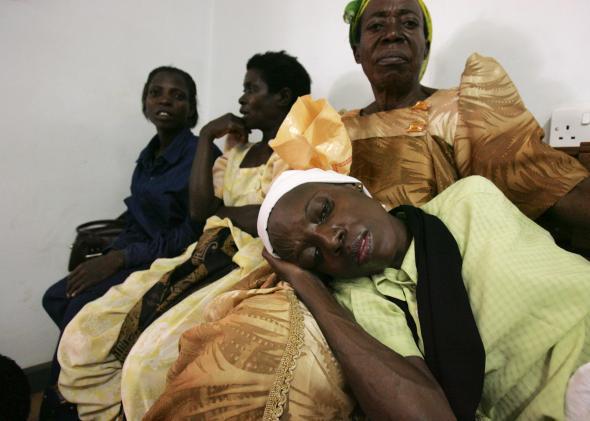This article originally appeared in The Conversation.
There are few aspirations that almost all of the globe’s human population shares. Good health is one, and I believe healthcare to be a fundamental human right. Illness impedes individuals from supporting themselves, their families, and their communities. Without health and good access to healthcare, a society cannot function.
But decisions such as the Ugandan parliament’s—with support from President Yoweri Museveni—to criminalize homosexuality, pose incredible barriers to health and human rights in Uganda and consequently around the world. Anti-gay legislation is unfortunately not new in Uganda or elsewhere, but the severity of the recent law is alarming. Any effort to outlaw or push lesbian, gay, bisexual, or transgender Ugandans out of sight, either through legislation or through outing them in the media, hurts the country, the health of all its people, and the ability to honor all its citizens with the fundamental rights and dignity they deserve.
This issue is especially important to the many organizations like mine working in Uganda to improve the health of—and access to healthcare for—people there. My organization’s mission is supporting U.S. doctors and nurses to help train a new generation of medical and nursing providers in Uganda and other countries. We and our Ugandan partners cannot do this if patients are put at risk by disclosing their sexual orientation, or doctors and nurses are put in harm’s way for treating LGBTQ Ugandans. We are also restricted from safely sending outstanding volunteers to Uganda if their sexual orientation puts them at risk.
Obstacles that prevent safe access to healthcare can be detrimental, but in countries like Uganda, which shoulder a disproportionate burden of disease, obstacles can be lethal. Uganda has the sixth-highest rate of people living with—and deaths related to—HIV/AIDS in the world. This is in addition to growing amounts of cardiovascular disease, malignancy, and non-communicable diseases or persistent challenges from trauma, or maternal morbidity and death, to name a few.
Ruhakana Rugunda, Uganda’s minister of health, recognizes the need for the LGBTQ community to have equal access to healthcare and, in a BBC interview, he said that in light of the recent ruling, “nobody will be discriminated from public healthcare simply because of his or her sexual orientation.” He added that “health workers will live up to their ethics of keeping confidentiality with their patients.”
While the spirit of the statement should be reassuring, how many Ugandan LGBTQ community members will take the chance of disclosing their sexuality? How many will take the chance of disclosure at any level versus the chance of life behind bars? And how many providers will feel safe reaching out wondering if they, too, will face repercussions?
The current law states that “a person who aids, abets, counsels or procures another to engage in acts of homosexuality commits an offence and is liable, on conviction, to imprisonment for seven years.” What will determine the definition of “counsel”? And would that person choose the risk of jail instead of the opportunity to help save lives elsewhere?
In a country with only 12 physicians and 131 nurses per 100,000 people, removing health professionals from the workforce has systematic detrimental effects. It is already influencing the international community, which provides partnership and support to the Ugandan health system: The United States and Canada have said they are reviewing their positions on aid to the country; Norway, Denmark, and the Netherlands have suspended assistance.
Compromised safety of healthcare providers could compel organizations to remove their personnel, drawing international workers out of Uganda, and with them the support to Uganda’s already taxed healthcare delivery system.
At its most basic level, the recent legislation is a violation of the sovereign principle that healthcare is a human right. Martin Luther King Jr. wrote from jail in 1963 that “injustice anywhere is a threat to justice everywhere.” In our interconnected world, where the passage of peoples, goods, and information across borders is now easy and in some cases instantaneous, threats to health and healthcare workers in any country is a threat to health and human rights for us all.
